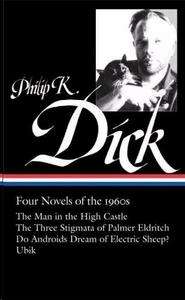Four Novels of the 1960s
. The Man in the High Castle, The Three Stigmata of Palmer Eldritch, Do Androids Dream of Electric Sheep?, Ubik

Editorial Library Of America
Fecha de edición mayo 2007
Idioma inglés
EAN 9781598530094
835 páginas
Libro
encuadernado en tapa dura
Resumen del libro
Known in his lifetime primarily to readers of science fiction, Philip K. Dick (1928 1982) is now seen as a uniquely visionary figure, a writer who, in editor Jonathan Lethem's words, "wielded a sardonic yet heartbroken acuity about the plight of being alive in the twentieth century, one that makes him a lonely hero to the readers who cherish him."
This Library of America volume brings together four of Dick's most original novels. The Man in the High Castle (1962), which won the Hugo Award, describes an alternate world in which Japan and Germany have won World War II and America is divided into separate occupation zones. The dizzying The Three Stigmata of Palmer Eldritch (1965) posits a future in which competing hallucinogens proffer different brands of virtual reality, and an interplanetary drug tycoon can transform himself into a godlike figure transcending even physical death.
Do Androids Dream of Electric Sheep? (1968), about a bounty hunter in search of escaped androids in a postapocalyptic society where status is measured by the possession of live animals and religious life is focused on a television personality, was the basis for the movie Blade Runner. Ubik (1969), with its future world of psychic espionage agents and cryonically frozen patients inhabiting an illusory "half-life," pursues Dick's theme of simulated realities and false perceptions to ever more disturbing conclusions, as time collapses on itself and characters stranded in past eras search desperately for the elusive, constantly shape-shifting panacea Ubik. As with most of Dick's novels, no plot summary can suggest the mesmerizing and constantly surprising texture of these astonishing books.
Posing the questions "What is human?" and "What is real?" in a multitude of fascinating ways, Dick produced works fantastic and weird, yet developed with precise logic, marked by wild humor and soaring flights of religious speculation that are startlingly prescient imaginative anticipations of 21st-century quandaries.
Biografía del autor
Philip K. Dick (1928-1982) es autor de 36 novelas de ciencia ficción y 121 relatos breves en los que exploró la esencia de lo que hace al hombre humano, así como los peligros del poder centralizado. Hacia el final de su vida enfocó su trabajo hacia cuestiones metafísicas profundamente personales relacionadas con la naturaleza de Dios. Muchas de sus novelas y cuentos cortos han sido llevados al cine y la televisión, entre los que destacan Blade Runner (basada en ¿Sueñan los androides con ovejas eléctricas?), Desafío total, Minority Report y El hombre en el castillo. A lo largo de su carrera, que abarcó tres décadas, recibió el reconocimiento de la crítica y numerosos premios. En 2005 fue incluido en el Salón de la Fama de la Ciencia Ficción.







